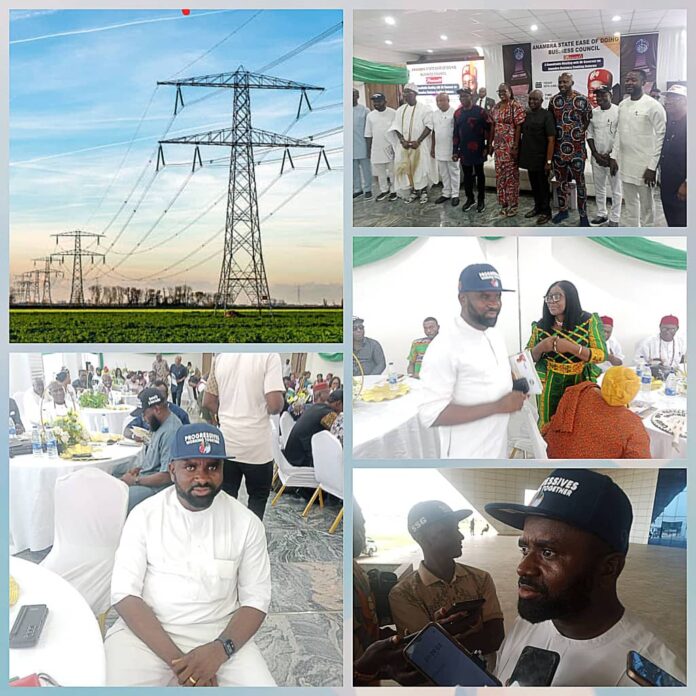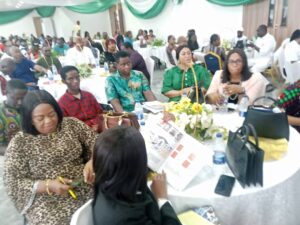By Izunna Okafor, Awka
The Anambra Commissioner for Power and Water Resources in Anambra State, Engr. Julius Chukwuemeka, has expressed strong optimism about the future of the power sector in the state, revealing that Anambra is strategically positioned to achieve stable, affordable, and greener electricity supply in the near future.
Engr. Chukwuemeka disclosed this over the weekend at the just-concluded roundtable meeting between Governor Chukwuma Charles Soludo and the Anambra business owners/investors on Ease of Doing Business, which held at the International Convention Center, Awka.
Speaking in an interview with this reporter, Izunna Okafor, Commissioner Chukwuemeka —who is also a member of the Anambra Ease of Doing Business (EoDB) Council which organized the event — emphasized the critical role of power in economic growth and industrialization, especially in a state like Anambra with vast industrial potential.
“No industry can thrive without access to electricity,” he noted, adding that the Soludo Administration has laid a solid foundation for an energy revolution that would soon see Anambra enjoy round-the-clock power supply sourced through affordable and eco-friendly means.
According to the Commissioner, the passage of the Nigerian Electricity Act in 2023 marked a pivotal turning point for the sector, as it granted state governments the constitutional backing to establish and regulate their own electricity markets. He disclosed that Anambra State has not only keyed into this development but is already ahead of many states in implementation.
“In Anambra, we’ve already passed our own Electricity Law, and Mr. Governor has graciously assented to it. That law now empowers us to regulate power generation, distribution, and consumption within our boundaries,” he said.
He announced that the Anambra Electricity Regulatory Commission (AERC) — an independent body that will oversee the state’s electricity sector — would be officially unveiled in the coming weeks, following recent approvals by the Anambra State Executive Council.
The Commissioner explained that the new Commission would take over regulatory responsibilities from the National Electricity Regulatory Commission (NERC) and would be responsible for licensing operators across multiple energy blocks within the state.
“This will open up the power sector to private investments and create a transparent licensing framework that will encourage innovation, competitiveness, and expansion,” he stated.
Engr. Chukwuemeka further revealed that the Ministry, in collaboration with Power Africa and USAID, had completed the development of an Integrated Resource Plan (IRP) for Anambra, which projected the state’s electricity needs over the next 20 years. According to him, the study estimated that Anambra’s electricity demand as of 2024 stood at 443 megawatts and could rise by over 132% to exceed 1,000 megawatts by 2044.
He said this data would serve as a roadmap for future infrastructure development and energy planning across the state, ensuring sustainable and targeted power investments.
In addition to the IRP, the Commissioner said Anambra has also developed its State Electricity Policy — another landmark document that clearly outlines operational guidelines, investment strategies, regulatory procedures, and a clear roadmap towards a renewable and decentralized energy future.
“Environmental sustainability is a core pillar of Mr. Governor’s administration. So when we talk about power, we are not just talking about having electricity, we’re talking about access to sustainable, affordable and cleaner energy,” he explained.
He revealed that the state was already taking practical steps to explore and harness its abundant gas reserves as a cleaner energy source, adding that discussions are currently ongoing on how to pipe natural gas directly to major industrial hubs in the state, including Onitsha Harbour, Nnewi, and the upcoming Anambra Mixed-Use Industrial City (AMIC), to reduce production costs and ensure energy availability for manufacturers.
“Tariffs are a major concern for our industries. But we know that you cannot reduce electricity tariffs unless you reduce the cost of power generation and delivery. That’s why we are working to bring the source closer to the point of use — whether through gas, solar, or other renewable solutions,” the Commissioner said.
He also responded to concerns raised during the roundtable regarding estimated billing, stressing that metering remains a priority in the Soludo administration’s power agenda.
“In our electricity policy, there is a strong emphasis on metering. We are working to ensure that in Anambra, nobody pays for power they didn’t consume. People must pay for what they use, and use what they pay for,” he emphasized.
According to him, metering will not only eliminate estimated billing but also help consumers better manage their energy consumption while building trust between energy providers and end-users.
The Commissioner also highlighted the growing adoption of solar energy across the state, noting that many households and even small businesses such as barbershops now power their operations using solar systems. He described this trend as a “green energy revolution” gradually transforming the state’s energy landscape.
He further disclosed that proposals are being received from investors and developers interested in converting Anambra’s large volume of waste into bioenergy. Given that Anambra has one of the highest population densities in the country after Lagos, the volume of waste generated daily could become a significant source of power through waste-to-energy conversion technologies.
“Instead of being an environmental nuisance, our waste can be turned into an economic and energy asset. There are proposals on ground to aggregate and sort our waste for conversion into biodiesel and other forms of clean energy,” he explained.
Concluding, Commissioner Chukwuemeka reiterated that Anambra is on the rise and fast becoming a model for sub-national power sector reform in Nigeria. He praised Governor Soludo’s visionary leadership and expressed confidence that with the new legal frameworks, institutional structures, and policy roadmap in place, the state’s electricity sector would witness exponential transformation.
“With this new law, the regulatory agency that is coming on board, and with the private sector partnerships we are facilitating, I am confident that in the very near future, Ndi Anambra will enjoy more stable, affordable, and cleaner power supply — and that will change everything, for our dear state and for our own good as Ndị Anambra,” he concluded.
More photos from the event:







































